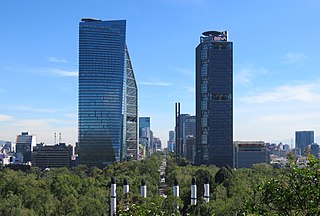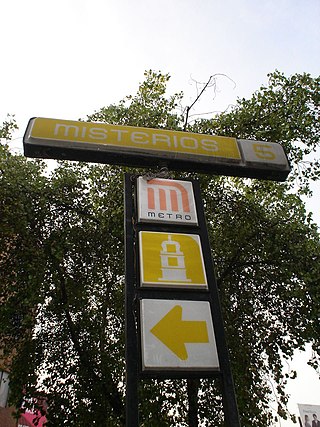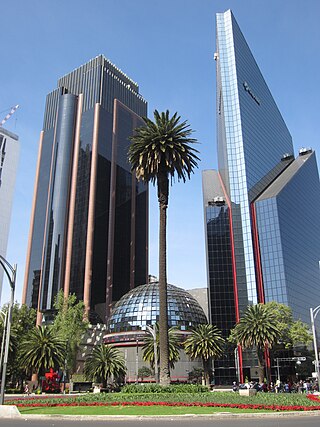Reforma, the Spanish word meaning reform, has the following meanings:
Reforma, the Spanish word meaning reform, has the following meanings:

Paseo de la Reforma is a wide avenue that runs diagonally across the heart of Mexico City. It was designed at the behest of Emperor Maximilian by Ferdinand von Rosenzweig during the era of the Second Mexican Empire and modeled after the great boulevards of Europe, such as the Ringstraße in Vienna and the Champs-Élysées in Paris. The planned grand avenue was to link the National Palace with the imperial residence, Chapultepec Castle, which was then on the southwestern edge of town. The project was originally named Paseo de la Emperatriz in honor of Maximilian's consort Empress Carlota. After the fall of the Empire and Maximilian's subsequent execution, the Restored Republic renamed the Paseo in honor of the La Reforma.
Hidalgo may refer to:
Palma or La Palma means palm in a number of languages and may also refer to:
San Pablo may refer to:

The Mexico City Metrobús, simply known as Metrobús, is a bus rapid transit (BRT) system that has served Mexico City since line 1 opened on 19 June 2005. As of February 2018, it consists of seven lines that cross the city and connects with other forms of transit, such as the Mexico City Metro. The most recent line to open was line 7, running for the first time double-decker buses along the city's iconic boulevard, Paseo de la Reforma.

Avenida de los Insurgentes, sometimes known simply as Insurgentes, is the longest avenue in Mexico City, with a length of 28.8 km (17.9 mi) on a north-south axis across the city. Insurgentes has its origins in what was during the early 20th century known as the Via del Centenario which ran from city centre to the southern suburbs.
San Simon or San Simón may refer to:
San Bartolo is the Spanish name for Saint Bartholomew. In Spanish speaking countries it is often used as part of placenames, including:

Transportation in Mexico City consists of multiple public transit systems that together conform the Integrated Mobility System of Mexico City. This System includes the Mexico City Metroextensive bus and bus rapid transit systems, as well as the Xochimilco Light Rail and cable cars. The city is serviced by the Benito Juárez International Airport which is supported by the Toluca and Zumpango airports, both in the neighboring State of Mexico. Additionally, like other cities around the world, Mexico City has public taxis, public buses and share taxis and rickshaws. Trajineras, gondola-like boats, service the Xochimilco Lake area. Previously, the city used to operate streetcars. The Greater Mexico City area has additional routes that provide services to the city, including the Tren Suburbano commuter railway, the Mexibús BRT network, and the Mexicable aerial lift system. The transport services are operated by public or private entities but all of them are regulated in the city by the Secretaría de Movilidad.

Misterios metro station is a Mexico City Metro station within the limits of Cuauhtémoc and Gustavo A. Madero, in Mexico City. It is an underground station with two side platforms, served by Line 5, between La Raza and Valle Gómez stations. Misterios station serves the colonias (neighborhoods) of Peralvillo and Vallejo.

Mexico City Metro Line 1 is one of the twelve Metro lines operating in Mexico City, Mexico. Officially inaugurated in 1969, it was the first metro line to be built in the country. Its identifying color is pink, and it runs west–east.

Line 2 is one of the 12 lines of the Mexico City Metro.
La Raza are the people of the Hispanic and Chicano world.

Avenida Reforma is a main boulevard in the east-center part of Guatemala City, the capital of Guatemala. It is considered one of the main thoroughfares of Guatemala City. It is 2.26 km (1 mi) in length, and has an average width of 60 meters (197 ft) from sidewalk to sidewalk.
Insurgentes is a Spanish word meaning insurgents and may refer to:

Mexico City Metro Line 7 is one of the twelve metro lines operating in Mexico City, Mexico.

Colonia Cuauhtémoc is a colonia in the Cuauhtémoc municipality of central Mexico City. It is located just north of Paseo de la Reforma, west of the historic center of Mexico City.

Glorieta de la Palma is a roundabout in Cuauhtémoc, Mexico City, that connects Paseo de la Reforma with Río Rhin Street and Niza Street. It is known for its tall palm tree that remained in the middle for a century. As of October 2024, the roundabout is the only one along Reforma that has never had a monument. The building of the Mexican Stock Exchange is at the roundabout, opposite the Zona Rosa. The area is serviced by the city's Metrobús system at El Ahuehuete BRT stop, whose pictogram formerly featured the palm tree.

The Young Woman of Amajac is a pre-Hispanic sculpture depicting an indigenous woman. It was discovered by farmers in January 2021 in the Huasteca region, in eastern Mexico.

The Esquina de la Información refers to the intersection of Paseo de la Reforma and Avenida Bucareli, in Colonia Juárez, Mexico City. The name originated after the former Excélsior newspaper headquarters building and, by extension, the El Universal newspaper headquarters, located across the street. Both are among the largest newspaper companies in Mexico.